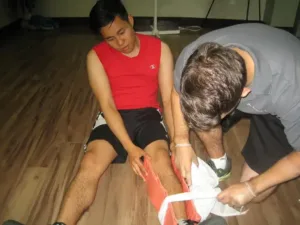Ottawa First Aid is the most popular, experienced and highest volume provider of cardiopulmonary resuscitation (CPR) and first aid training in the Ottawa, Ontario area. The most popular program available is standard first aid which is a two-day course that comes standard with CPR level “C” and AED training. Other courses include emergency and childcare first aid. Childcare first aid is a two day course and emergency first aid is a basic one day course. Both also include CPR and AED training. Participants enrolled in basic or advanced first aid training will learn about anaphylaxis, seizures, poisonings, wound care, head injuries, spinals, broken bones, circulatory emergencies, breathing emergencies and many more. You can visit the Ottawa First Aid website here to look at a complete list of first aid training classes available.
Contact Information for First Aid Training in Ottawa, Ontario Here
Contact this provider using the following details:
- Website address: www.firstaidcprottawa.ca
- Email address: info@firstaidtrainers.ca
- Call Toll Free: (250) 410-2833
Ottawa First Aid
First Aid and CPR Courses
All programs are offered at the least expensive costs in Ottawa. Rates include taxes, certification fees, and St Mark James training manuals. Beyond the initial enrolment fee, there are no additional expenses during the training period. Full refunds are also given to trainees who provide 72-hour notices before dropping out. Certification Programs Participants that need both first aid, CPR and AED training can enrol in one of the three courses for basic first aid training:
-
First Aid Training in Ottawa Standard first aid – 14 hour course that covers a wide range of first aid topics and includes either CPR level “A”, “C” or “HCP”. Easily the most popular and required course.
- Emergency first aid – 8 hour course that covers basic topics such as circulatory and breathing emergencies. Comes standards with CPR level “A” but can also come with level “C” or “HCP”.
- Childcare first aid – 14 hour course similar to standard first aid with additional components for individuals that work in the daycare industry.
Participants that want to enrol in CPR and AED only training can select from the following courses:
- CPR level “A” – the most basic of all CPR courses which teaches participants rescue techniques for adult victims.
- CPR level “C” – encompasses all of CPR level “A” but adds components for child and infant rescues.
- CPR level “HCP” – encompasses of all of CPR level “HCP” but adds components for health care providers such as CPR with trained assistance and the use of bag-valve masks.
Other Courses:
- Wilderness first aid – this course is an advanced one week course that teaches more advanced rescue techniques as well as CPR and AED training.
- Basic life support (BLS) – this course is a 4 hour course that teaches basic CPR and life support techniques.
- Advanced cardiovascular life support (ACLS) – this course is a two day course that teaches advanced life support techniques for individuals that work in the health care / medical industry.
- WHMIS training – this on-line course teaches workplace safety and hazardous materials training.
- Food handling / safety training – this course teaches participants about proper food handling, management and preparation techniques and is a requirements for many food handling, preparation, transportation and storage industries.
Private Training To book a private course or to receive a quote for group training at the Ottawa training centre or at your location use the contact information provided above. Facilities All training centres in Ottawa are high-end, spacious, and well-maintained. Only the latest AED trainers, training mannequins, and first aid training kits. The centres are easily accessible by both public and private transportation as well. Restaurants, shops, and free parking are easily within walking distance.
Did You Know?
Angina (chest pain)
Angina is a kind of chest pain that occurs because of decreased blood flow to the heart. With decreased blood flow to the heart, the heart tissue and muscle aren’t receiving enough oxygen. Oxygen is needed by the cells to function, so any decrease in blood flow causes damage to form and function. Angina is typically a symptoms of an underlying condition such as coronary artery disease (CAD). CAD is when the coronary arteries that supple the heart with blood are narrowed or blocked with plaque. Angina usually happens suddenly, usually with strenuous activity. Dangerous anginas occur even at rest. Chest pain should always be a concern and receive medical attention for.
